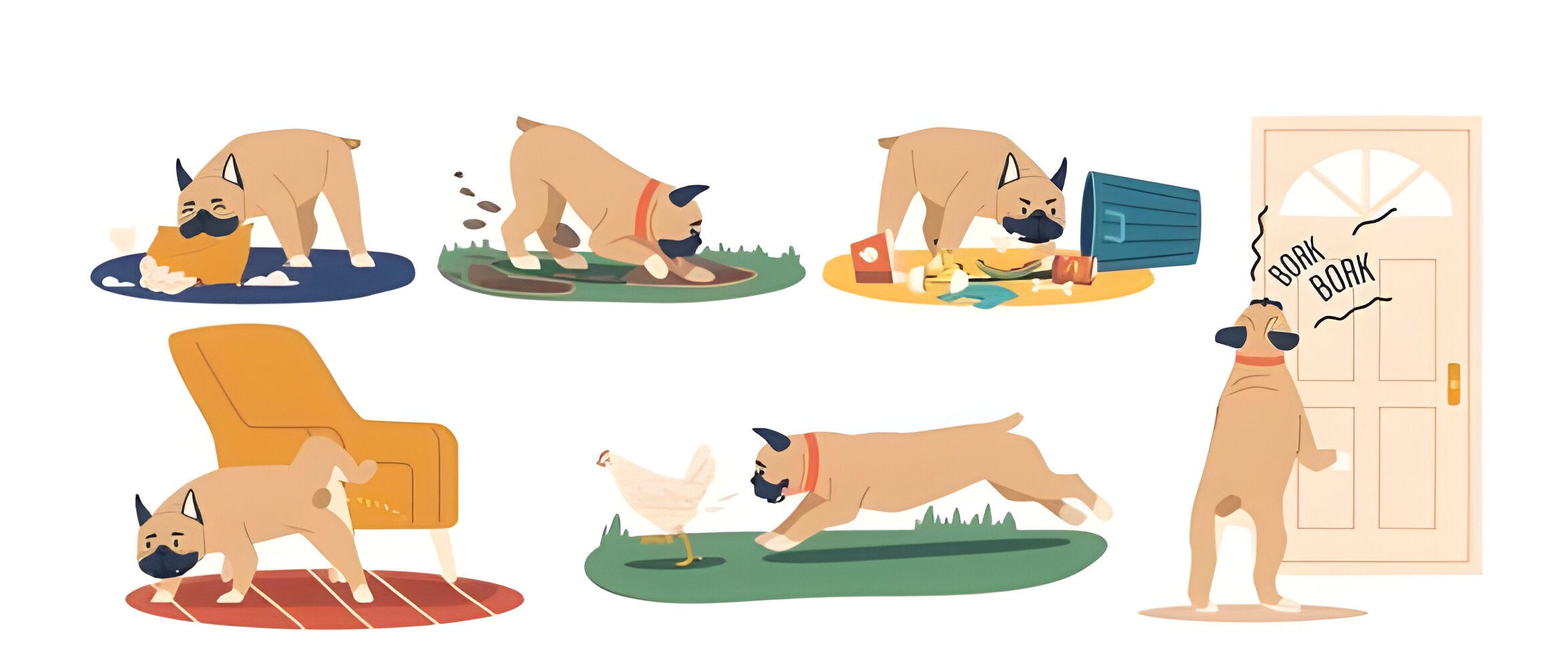
7 Common Problems in Dogs
As devoted pet owners, we cherish the companionship and loyalty of our furry friends. However, amidst the joy they bring, dogs also face their fair share of health challenges and behavioral issues. Understanding these common problems in dogs is crucial for providing optimal care and ensuring their well-being. From canine health issues to behavioral concerns, let's delve into the seven most prevalent problems faced by our beloved canine companions.
Understanding common dog problems
Understanding common dog problems is essential for pet owners to provide the best care for their furry friends. Dogs can face a variety of issues, ranging from behavioral problems to health concerns. Behavioral problems like excessive barking, destructive chewing, and aggression can disrupt the harmony of the household if not addressed promptly and appropriately. On the other hand, health problems such as obesity, allergies, dental issues, and infectious diseases can impact a dog's overall well-being and quality of life.
Being aware of these common problems enables pet owners to recognize signs early, seek proper veterinary care, and implement preventive measures to ensure their dogs lead happy, healthy lives. Regular vet check-ups, proper nutrition, exercise, and attention to behavioral training are crucial in mitigating these common dog problems and fostering a strong bond between pets and their owners.
7 Common problems Faced by dogs
Dog behavior problems are among the most prevalent issues faced by pet owners, often leading to frustration and concern. From excessive barking to destructive chewing, these behavior problems can disrupt the harmony of a household. In addition to behavioral issues, common problem in dogs include separation anxiety, aggression, and fearfulness. Poor socialization during puppyhood can contribute to these problems, emphasizing the importance of early training and socialization efforts.
Additionally, health issues such as obesity and dental problems can impact a dog's overall well-being and behavior. Addressing these common problem in dogs requires patience, consistency, and often professional guidance to ensure a happy and harmonious relationship between dogs and their owners.
Behavior problems in dogs:
Dog behavior problems encompass a wide range of issues such as excessive barking, destructive chewing, aggression, separation anxiety, fearfulness, leash pulling, resource guarding, jumping on people, digging, and escaping. These behaviors can disrupt the harmony of a household and require proper training and management techniques to address them effectively.
Separation Anxiety:
Many dogs experience separation anxiety when left alone, leading to destructive behaviors, excessive barking, and even self-harm. Training methods and gradual desensitization can help alleviate separation anxiety in dogs.
Aggression:
Aggression in dogs can manifest towards other animals or humans and may result from fear, territorial instincts, or past trauma. Professional behavior modification techniques and proper socialization are essential for managing and reducing aggressive behaviors in dogs.
Fearfulness:
Some dogs exhibit fearfulness towards certain stimuli, such as loud noises, unfamiliar people, or other animals. Positive reinforcement training and gradual exposure to fearful stimuli can help dogs overcome their fears and build confidence.
Leash Pulling:
Leash pulling can make walks challenging and unpleasant for both dogs and owners. Teaching loose leash walking techniques and using appropriate equipment like harnesses can help curb leash pulling behavior.
Resource Guarding:
Dogs may display resource guarding behaviors, becoming possessive over food, toys, or territory. Training methods such as counterconditioning and desensitization can address resource guarding issues and promote sharing behavior in dogs.
Excessive Digging and Escaping:
Some dogs engage in excessive digging or escaping behavior, which can pose safety risks and cause property damage. Providing mental and physical stimulation, along with proper containment measures, can help deter dogs from digging and escaping.
Addressing these common problem in dogs requires patience, consistency, and sometimes professional guidance to ensure a happy and harmonious relationship between dogs and their owners.
How to manage these common dog problems
Managing common dog problems requires a combination of understanding, patience, consistency, and sometimes professional guidance. Here's how to address each of the seven common problem in dogs:
Solution to dog behavior problem:
Identify the specific behavior issues your dog is exhibiting and understand the root causes. Implement positive reinforcement training techniques to encourage desired behaviors and discourage undesirable ones. Consistently enforce rules and boundaries to provide structure and guidance for your dog. Seek advice from professional dog trainers or behaviorists for personalized guidance and support.
Managing Separation Anxiety:
Gradually acclimate your dog to being alone through short absences and gradually increasing the duration. Provide engaging toys or puzzles to keep your dog mentally stimulated during periods of separation. Use calming aids such as pheromone diffusers or calming music to help ease anxiety. Consider behavior modification techniques or medication under the guidance of a veterinarian or behaviorist for severe cases.
Aggression management:
Identify triggers that provoke aggression in your dog and avoid or manage these situations whenever possible. Implement positive reinforcement training to teach alternative, incompatible behaviors to replace aggressive responses. Practice controlled socialization in a safe environment under the supervision of a professional trainer. Use management tools such as muzzles or head collars when necessary to prevent aggressive incidents.
Dog Fear Management:
Gradually expose your dog to fearful stimuli in a controlled and positive manner, using treats and praise to create positive associations. Avoid forcing your dog into situations that trigger fear and instead allow them to approach new experiences at their own pace. Provide a safe retreat or hiding spot where your dog can seek comfort when feeling anxious. Consult with a professional trainer or behaviorist for desensitization and counterconditioning protocols tailored to your dog's specific fears.
Leash Pulling solution for dogs:
Use reward-based training methods to teach loose leash walking, rewarding your dog for walking calmly by your side. Practice frequent and consistent leash training sessions in low-distraction environments before gradually increasing difficulty. During training, use devices like head halters or front-clip harnesses to help control tugging.
Managing Resource Guarding:
Teach your dog to trade valuable items for high-value treats or toys to encourage sharing behavior. Avoid triggering resource guarding by respecting your dog's personal space during meal times or when they have prized possessions. Gradually desensitize your dog to the presence of people or other animals near their resources through positive reinforcement training.
Excessive digging and escaping solutions:
Provide mental and physical stimulation through regular exercise, interactive play, and enrichment activities to reduce boredom and excess energy. Designate a specific area in your yard where digging is permitted and encourage digging behavior in that area by burying toys or treats. Secure fencing and gates to prevent escapes and supervise outdoor time to discourage digging or escaping behavior.
Consistency, patience, and positive reinforcement are key to effectively managing common dog problems. If you're struggling to address these issues on your own, don't hesitate to seek guidance from a professional dog trainer or behaviorist who can provide tailored solutions and support.
Common Dog health challenges
Some common dog health challenges encompass a wide range of issues that can affect our furry friends. These challenges often arise due to various factors such as genetics, environment, diet, and lifestyle. Understanding and recognizing these health challenges are essential for ensuring the well-being of our canine companions. Here are some prevalent pet wellness concerns:
Obesity:
Just like humans, dogs can struggle with obesity, which can lead to a myriad of health problems such as diabetes, joint issues, and heart disease. Overfeeding, lack of exercise, and improper diet contribute to obesity in dogs. Maintaining a healthy weight through balanced nutrition and regular exercise is crucial for preventing obesity-related health issues.
Dental Problems:
Dental hygiene is often overlooked in dogs, leading to common issues like periodontal disease, tooth decay, and bad breath. Poor dental health can affect a dog's overall well-being, as bacteria from the mouth can enter the bloodstream and cause systemic problems. Regular dental care, including brushing, dental chews, and professional cleanings, is essential for preventing dental issues.
Allergies:
Dogs can suffer from various allergies, including food allergies, environmental allergies such as pollen or dust mites, and flea allergies. Allergic reactions can manifest as itching, skin irritation, gastrointestinal issues, and respiratory problems. Dog allergy reactions can be controlled with the help of a veterinarian for the necessary care as well as by recognising and avoiding allergens.
Joint Problems:
Joint problems such as arthritis and hip dysplasia are common in dogs, particularly as they age. These conditions can cause pain, stiffness, and mobility issues, significantly impacting a dog's quality of life. Providing joint supplements, maintaining a healthy weight, and engaging in low-impact exercises can help manage joint problems and alleviate discomfort.
Parasites:
Dogs are susceptible to various parasites, such as fleas, ticks, worms, and mites, which can cause a range of health problems. Parasites not only irritate the skin but can also transmit diseases and cause internal damage if left untreated. Regular parasite prevention through topical treatments, oral medications, like 1. Tick and flea spray 2. Tick and flea powder 3. Tick shampoo for dogs from Zoivane pets and routine vet checks, are crucial for protecting dogs from parasitic infestations.
Digestive Disorders:
Digestive disorders such as gastritis, pancreatitis, and inflammatory bowel disease are common in dogs and can result from dietary indiscretion, infections, or underlying medical conditions. Symptoms may include vomiting, diarrhea, bloating, and abdominal pain. A balanced diet, proper hydration, and veterinary care are essential for managing digestive disorders and promoting gastrointestinal health.
Cancer:
Unfortunately, cancer is a prevalent health challenge in dogs, with various forms affecting different breeds and age groups. Early detection through regular screenings and veterinary check-ups is crucial for improving treatment outcomes. Treatment options may include surgery, chemotherapy, radiation therapy, and palliative care to enhance the dog's quality of life.
Addressing these common dog illnesses requires a proactive approach that includes regular veterinary care, preventive measures, proper nutrition, and attentive monitoring of your dog's overall well-being. By staying informed and vigilant, pet owners can help their canine companions in preventing dog health issues and make them live longer, happier, and healthier lives.
Conclusion:-
Understanding the common problem in dogs that they face, empowers pet owners to provide the best possible care for their furry friends. By addressing canine health issues, behavioral concerns, and wellness needs proactively, we can nurture strong, fulfilling relationships with our canine companions while promoting their longevity and happiness. With a commitment to preventive care, responsible pet ownership, and a deep understanding of our dogs' individual needs, we can overcome challenges and create a thriving environment where our beloved pets can thrive.




2 من التعليقات
Dogs bring so much joy to our lives, but they can also face various health and behavioral challenges that require our attention. Find your perfect puppy companion and complete your family by browsing the wonderful options at Mydogbreeds.com.
My dog breeds
I especially appreciate how the article explains not just the symptoms but also the causes behind these problems, which gives a better understanding of how to prevent them. Petzlover.com offers a streamlined and transparent way to find and buy puppies, giving you peace of mind in your search.
Petzlover
اترك تعليقًا
This site is protected by hCaptcha and the hCaptcha Privacy Policy and Terms of Service apply.